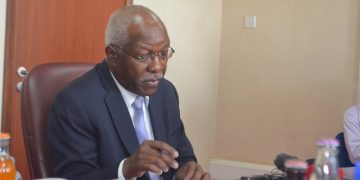The Auditor-General John Muwanga has revealed that 24.73 billion Shillings remains outstanding as a result of decisions of courts for refund of proceeds of corrupt practices not being implemented.
This was one of the findings in the AG’s new audit report for financial year 2020-21, that was tabled before Parliament. Muwanga presented the same report to Deputy Speaker of Parliament, Anita Among on Wednesday.
In the report, Muwanga reveals weaknesses in the management of recoveries arising out of anti-corruption cases.
“Section 10(4) of the Anti-corruption Act, provides that in addition to any other penalty imposed upon conviction on a person, that person is ordered to make good the loss occasioned to the property; and the value of the property or damage to the property shall constitute a civil debt from the person to the Government or public body concerned and shall be recoverable from that person,” reads part of the audit report.
Muwanga says that a review of decisions from the Anti-corruption Division of the High Court revealed that on several instances, the court has made orders as to refund of proceeds of corrupt practices by persons convicted but a sample of cases reviews indicate that 24.73 billion has not been refunded as proceeds of corrupt practices.
This is not the first time the audit report reveals a failure to recover money from corrupt practices.
In the Auditor General’s report regarding the Office of the Director of Public Prosecution (DPP) for financial year 2019/2020, Muwanga observed that a total of 18.94 billion Shillings remained uncollected in spite of the setup of a department within the Office of the DPP responsible for enforcing the recovery of compensation orders.
The gaps in the collection were then partly attributed to the lack of a clear mandate to the DPP, especially in so far as recoveries of the compensation would require civil processes which are outside the mandate of the criminal mandate of the Office of the DPP.
“Whereas the mandate of recovery would be a reserve of the Attorney General who is vested with the mandate to litigate civil matters, it was noted that the Office of the Director of Public Prosecution has in place a unit for recovery of funds arising out of prosecutions in DPP while the Inspector General of Government (IGG) also has another,” says Muwanga.
The Auditor General notes that failure to enforce the recovery of court orders denies the government the funds that should have been generated and undermine the objective of recovering from losses incurred by the government due to corrupt practices.
Muwanga says that it is therefore important that government comes up with a regulatory framework that addresses the inadequate legislation on recovery of proceeds of crime; provide for civil asset recovery, detailed procedures in conviction-based recovery, asset management and disposal, recovery of consequential benefits, and how to apply the recovered proceeds.
“The Accounting Officer responded that the Ministry had initiated consultations with the Office of DPP, IGG and Attorney General for the establishment of comprehensive procedures for recovery of proceeds of crime, provide for civil asset recovery, provide for detailed guidelines in conviction based recovery, provide for asset management and disposal, recovery of consequential benefits including the application of the recovered proceeds,” Muwanga further reports.
Recently, officials from the Inspectorate of Government told MPs sitting on the Legal and Parliamentary Affairs Committee that recovery of proceeds of corrupt practices is challenged by limited financial resources. URN











